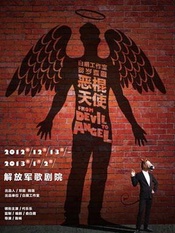Devil and Angel
恶棍天使
China, 2015, colour, 2.35:1, 124 mins.
Directors: Deng Chao 邓超, Yu Baimei 俞白眉.
Rating: 8/10.
Precision film-making and great lead chemistry make this cartoony rom-com into something special.
A city in China, the present day. Six months after being sacked from her last job for exposing corruption in the company, accountant Zha Xiaodao (Sun Li) sees a flyer for the quasi-religious Zhe Ergen Psychology Institute and goes there for advice. The institute’s quack head, Zhe Ergen (Liang Chao), suggests she meets another of his patients who is her polar opposite – hooligan, never-say-die debt collector Mo Feili (Deng Chao) – in the hope that their personalities will cancel each other out. (In fact, the two already met earlier, when his car knocked her down at a pedestrian crossing and he accused her of insurance fraud.) She joins up with him to collect RMB3.2 million owed to employees sacked en masse from an amusement arcade. After beating up some ruffians, and their female leader Rui Simo (Zhao Manzhu), they get the money. But the people behind the scam turn out to be the same ones – chairman Hua (Wang Yanhui) and his manager Ji (Luan Yuanhui) – who ran the company Zha Xiaodao was sacked from. Homeless, Zha Xiaodao stays with Mo Feili, who lives in a vast underground hotel-cum-village beneath a disused factory that’s run by Guo Sisi (Da Lele), who holds a torch for him. Next day, Hua sends Russian-Chinese thug Ivanov Lazulakudoli (Xu Kejia) to beat up Mo Feili and retrieve the money. (The two already met earlier, on Makalu Peak in the Himalayas, when Mo Feili was collecting another debt.) Mo Feili and Zha Xiaodao finally escape, but Hua’s people have put a tracer in their car.
REVIEW
The second big-screen collaboration between comic actor Deng Chao 邓超 and TV/theatre writer Yu Baimei 俞白眉, Devil and Angel 恶棍天使 is another cartoony, knockabout comedy like their previous The Breakup Guru 分手大师 (2014) but is a big step-up on every level, a precision work that seems to have learned the lessons of Guru and profited from them. Basically an odd-couple two-hander – with Deng as a hooligan debt collector and actress Sun Li 孙俪 as his polar opposite, a by-the-rules accountant who literally walks in straight lines and takes everyone at face value – it features several of the same cast and crew as Guru, as well as Deng and Yu again co-directing. Though a far superior movie, and released as an end-of-the-year attraction, Devil took almost exactly the same amount as Guru a year-and-a-half earlier – disappointing, maybe, in the circumstances but still a very meaty hawl (RMB650 million) for an essentially modest character comedy.
 Deng’s roots are in theatre and revue, and like Guru this one is also freely based on a play by Yu, From Devil to Angel 恶棍天使 (2012), directed by Chen Chang 陈畅 and performed by the Baimei Studio 白眉工作室 (see poster, left). Instead of trying to set the story within a recognisably real world, this time Deng and Yu parallel the stage production’s abstract look by choosing industrial settings with no specific sense of place or connection with ordinary life. As a result, the cartoony characters seem much less over-cooked in their own world. But the biggest improvement is in the casting of the female lead: where in Guru sad-kooky actress Yang Mi 杨幂 lacked the screen presence and sheer experience to counter-balance Deng’s physical antics, in Devil actress Sun (Deng’s real-life wife) has both, as well as a natural chemistry and sense of timing that carries the movie.
Deng’s roots are in theatre and revue, and like Guru this one is also freely based on a play by Yu, From Devil to Angel 恶棍天使 (2012), directed by Chen Chang 陈畅 and performed by the Baimei Studio 白眉工作室 (see poster, left). Instead of trying to set the story within a recognisably real world, this time Deng and Yu parallel the stage production’s abstract look by choosing industrial settings with no specific sense of place or connection with ordinary life. As a result, the cartoony characters seem much less over-cooked in their own world. But the biggest improvement is in the casting of the female lead: where in Guru sad-kooky actress Yang Mi 杨幂 lacked the screen presence and sheer experience to counter-balance Deng’s physical antics, in Devil actress Sun (Deng’s real-life wife) has both, as well as a natural chemistry and sense of timing that carries the movie.
Largely known for her TV work, Shanghai-born Sun, then 33, had shown a relaxed sense of fun as the lead in costume spoof Just Another Pandora’s Box 越光宝盒 (2010), one of several films for Hong Kong comic director Liu Zhenwei 刘镇伟 [Jeff Lau]; she’d also co-starred with Deng in the costume fantasy Mural 画壁 (2011), an iffy drama whose unfocused direction had failed to strike sparks. Devil was her first comic lead role on the big screen and she fully rises to the challenge, gradually turning a cartoon character (buck teeth, goofy glasses, wide-eyed look) into one of comic pathos as she falls for Deng’s wired, violent, ruffian anti-hero. It’s the kind of scenery-chewing role that Deng relishes, and he sinks his teeth deep in here. But Sun is more than his match, both at the physical stuff as well as his trademark mock-bravado comedy, and the pair’s timing is immaculate.
That’s just as well, as there’s precious little plot on which to hang the series of comic confrontations and dialogue exchanges, as the duo – paired up by a quack psychologist, on the basis that opposites cancel each other out – are chased hither and thither by some bad guys who want their illicit gains back. The film is best seen as an offbeat rom-com, a series of character sketches loosely linked by a crime plot; the miracle is that it sustains interest for two hours on the sheer strength of the cast and the imaginative direction. Aside from the physical gags (a car with a sliding passenger seat is especially neat), there’s much humorous wordplay in the early stages: for example, Deng’s character name, Mo Feili 莫非里, sounds almost the same as “grope rape” 摸非礼 in Chinese, and a whole sequence where he can’t pronounce the name of a female gang leader is also very funny. The widescreen photography by Chinese American d.p. Wang Dayong 汪大勇 [Max Wang] (What Women Want 我知女人心, 2011) makes the most of the drab industrial settings, with geometrical framing (as in the opening and closing titles) that matches the precision of the performances. Though using familiar situations, Deng and Yu seem keen to reinvent them wherever possible: the big-brawl finale, for example, is staged almost as a musical number.
Familiar faces or members of Baimei Studio are scattered through the cast, with Yu’s actress wife, Dai Lele 代乐乐 – who played Sun’s role in the original stage production – having a whale of a time as the owner of an underground hotel with an unrequited love for Deng’s brawler. Liang Chao 梁超, who played the self-improvement author in Guru, pops up here as a quack psychologist, while others are scattered through the cast, like Zhao Manzhu 赵曼竹 (as a punk female gang leader), Luan Yuanhui 栾元晖 (the villain’s oily sidekick) and Xu Kejia 许可嘉 (a Russian-Chinese thug). Reflecting the cast’s theatrical backgrounds, even small roles are well-characterised, with notable playing by Yang Xinming 杨新鸣 as an employees’ representative and theatre/film veteran Zhang Lu 张鹭 as the stern mother of Sun’s character.
However, the quiet star of the whole enterprise is the cutting by noted Hong Kong editor/post-production fixer Lin An’er 林安儿 [Angie Lam], who doesn’t waste a frame but imparts no sense of rush. Judging by the copious out-takes shown in the end titles, a large number of sequences (including some set in Republican China) didn’t make the final cut, and the movie seems to benefit enormously from Lin’s ruthlessness and expertise. Also notable is the inspirational score, which works its magic first during a flashback to Mo Feili’s youth and later during a rooftop love scene and the end titles.
For the record, the first word of the film’s Chinese title literally means “ruffian” or “hooligan” rather than “devil”.
CREDITS
Presented by Tianjin Orange Image Media (CN), Shannan Enlight Pictures (CN), Shanghai Huixing Huiying Film & TV Culture Studio (CN), Horgos Orange Image Media (CN), Horgos Youth Enlight Pictures (CN). Produced by Tianjin Orange Image Media (CN), Shannan Enlight Pictures (CN), Shanghai Huixinghuiying Film & TV Culture (CN), Horgos Orange Image Media (CN), Horgos Youth Enlight Pictures (CN).
Script: Yu Baimei. Play: Yu Baimei. Photography: Wang Dayong [Max Wang]. Editing: Lin An’er [Angie Lam], Li Jiahua. Music: Gao Xiaoyang, Li Bin, Wang Zhe. Music supervision: Wang Zhe. Art direction: Hao Yi. Styling: Hao Yi, Liu Qian. Sound: Feng Yanming, Dong Xu, Zhang Jia. Action: Luo Yimin [Norman Law]. Visual effects: He Xuesong, Jiang Chao Wang Xiaowei, Sun Haidong, Zhang Wei (Changkong Yihua). Executive direction: Li Shaofei.
Cast: Deng Chao (Mo Feili), Sun Li (Zha Xiaodao), Dai Lele (Guo Sisi), Liang Chao (Zhe Ergen), Xu Kejia (Ivanov Lazulakudoli), Luan Yuanhui (Ji), Zhao Manzhu (Rui Simo), Wang Yanhui (Hua), Yang Xinming (Ding), Zhang Lu (Zha Xiaodan’s mother), Wang Shuangbao (Bao), Zhang Yuechi (Makalu Peak guide), Zhang Zhenlei (San’er), Yu Beibei (pretty nurse), Huo Da (boy on children’s ride), Zou Xuanqi (young Mo Feili), Zhang Zimu (young Zha Xiaodan), Bai Cai (fish seller), Guo Peng (teacher), Sun Dachuan (Didi service agent), Wang Shuaishuai (restaurant waitress), He Meixuan (motorcycle babe), Fan Kechang (fat student), Li Shaofei (security head).
Release: China, 24 Dec 2015.
